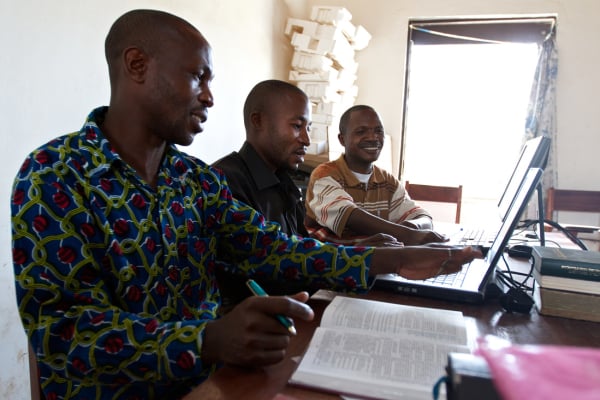
May 9, 2012
When Does Life Begin?
Read the series: Part 1 | Part 2 | Part 3 | Part 4
At what point does a group of disciples become a church? In answering this, I believe we must be careful not to respond on the basis of our cultural experience as children of the Western, institutionalized church. Crossworld President Dale Losch addresses this question.
At what point does a group of disciples become a church? In answering this, I believe we must be careful not to respond on the basis of our cultural experience as children of the Western, institutionalized church. Crossworld President Dale Losch addresses this question.
Where Do You Want to Go?
by Dale Losch, President of Crossworld
Our answer to the question, in reference to the sanctity of life debate, has profound implications for both mother and child. A conviction that life begins at conception rather than at birth dramatically elevates the value we place on the unborn child.
This question, when applied to disciple-making and church planting, also has some very significant implications. If disciple-making is merely a program, function or curriculum — something that happens, for example, on Tuesday evenings in the church basement — then it is easily lost or discarded in favor of more important priorities.
If, on the other hand, it is viewed as it should be — as the very heart and soul of what is necessary to develop a healthy community of Jesus-followers — then it becomes as valuable and important to nurture and protect as a developing embryo in its mother’s womb.
Some have struggled with the idea of elevating disciple-making to a place of such prominence, fearing that somehow it will diminish the importance of the church. Though they might never state it this way, it’s almost as if they’re saying, “Disciple-making is fine, but it doesn’t count as much as church planting does.” The problem with such thinking is that it makes a dichotomy of what God designed as a continuum.
So when does a group of disciples become a church? Let’s first ask the question of human life. When does that developing embryo become a living being? Is it when it has a hundred, a thousand or a million cells? Is it when a fetal heartbeat can be detected at week six? Or is it at the end of week seven when everything that is present in an adult human is present in the developing embryo? Do the parents only think of it as a real baby when they can finally see all its body parts on the ultrasound, or not until the fetus actually passes through the birth canal? While no one would say that a 12- or 15-week-old fetus is already a fully-developed human being, all who believe that life begins at conception would agree that the fetus is fully a human being, albeit in embryonic form.
So when does a church become a church? Is it when there are two disciples who are mutually committed to each other’s spiritual development? Or is it when there are four, eight or 16? Is it only once it has developed enough that one can actually know who the head, hands and feet are? Is it when the elder has been named an elder and the deacon a deacon? Or is it only when the church has been clothed with an official meeting place?
I would maintain that as soon as the Spirit of God penetrates the human heart and regeneration occurs, the seed of a new community of faith (or the growth of an existing one) begins. And when that disciple multiplies to two disciples and they multiply to four, eight and 16, the embryonic form of a new community of faith (the church) results.
At Crossworld, we have chosen to focus on the mandate Jesus gave to us: to make disciples who make disciples. We have chosen to do so out of love for Christ and His church. And we believe that if we focus on this mission, communities of disciples will begin to develop, individual members and roles will become progressively evident and healthy “bodies” will be born.
This question, when applied to disciple-making and church planting, also has some very significant implications. If disciple-making is merely a program, function or curriculum — something that happens, for example, on Tuesday evenings in the church basement — then it is easily lost or discarded in favor of more important priorities.
If, on the other hand, it is viewed as it should be — as the very heart and soul of what is necessary to develop a healthy community of Jesus-followers — then it becomes as valuable and important to nurture and protect as a developing embryo in its mother’s womb.
Some have struggled with the idea of elevating disciple-making to a place of such prominence, fearing that somehow it will diminish the importance of the church. Though they might never state it this way, it’s almost as if they’re saying, “Disciple-making is fine, but it doesn’t count as much as church planting does.” The problem with such thinking is that it makes a dichotomy of what God designed as a continuum.
So when does a group of disciples become a church? Let’s first ask the question of human life. When does that developing embryo become a living being? Is it when it has a hundred, a thousand or a million cells? Is it when a fetal heartbeat can be detected at week six? Or is it at the end of week seven when everything that is present in an adult human is present in the developing embryo? Do the parents only think of it as a real baby when they can finally see all its body parts on the ultrasound, or not until the fetus actually passes through the birth canal? While no one would say that a 12- or 15-week-old fetus is already a fully-developed human being, all who believe that life begins at conception would agree that the fetus is fully a human being, albeit in embryonic form.
So when does a church become a church? Is it when there are two disciples who are mutually committed to each other’s spiritual development? Or is it when there are four, eight or 16? Is it only once it has developed enough that one can actually know who the head, hands and feet are? Is it when the elder has been named an elder and the deacon a deacon? Or is it only when the church has been clothed with an official meeting place?
I would maintain that as soon as the Spirit of God penetrates the human heart and regeneration occurs, the seed of a new community of faith (or the growth of an existing one) begins. And when that disciple multiplies to two disciples and they multiply to four, eight and 16, the embryonic form of a new community of faith (the church) results.
At Crossworld, we have chosen to focus on the mandate Jesus gave to us: to make disciples who make disciples. We have chosen to do so out of love for Christ and His church. And we believe that if we focus on this mission, communities of disciples will begin to develop, individual members and roles will become progressively evident and healthy “bodies” will be born.
More Articles
TOGO — A man prayed for 38 years for the church to come to his village.
August 6, 2025
CANADA — A routine maintenance visit leads to a search for eternal truth.
September 3, 2025
CENTRAL ASIA — A chemistry class assignment sparks questions of faith for Maya in Asia.
October 1, 2025
FRANCE — Lucie’s isolated faith turns to bold witness in her new community.
November 5, 2025
MEXICO — Andrew’s encounter at the doorstep served an entirely different purpose.
February 4, 2026
BRAZIL — A paraplegic woman comes to faith through a gospel necklace and helps others do the same.
January 7, 2026
WEST ASIA — A Christmas gift melted Liliya’s desire for revenge.
December 3, 2025
.png)

 By John Spadafora
By John Spadafora











